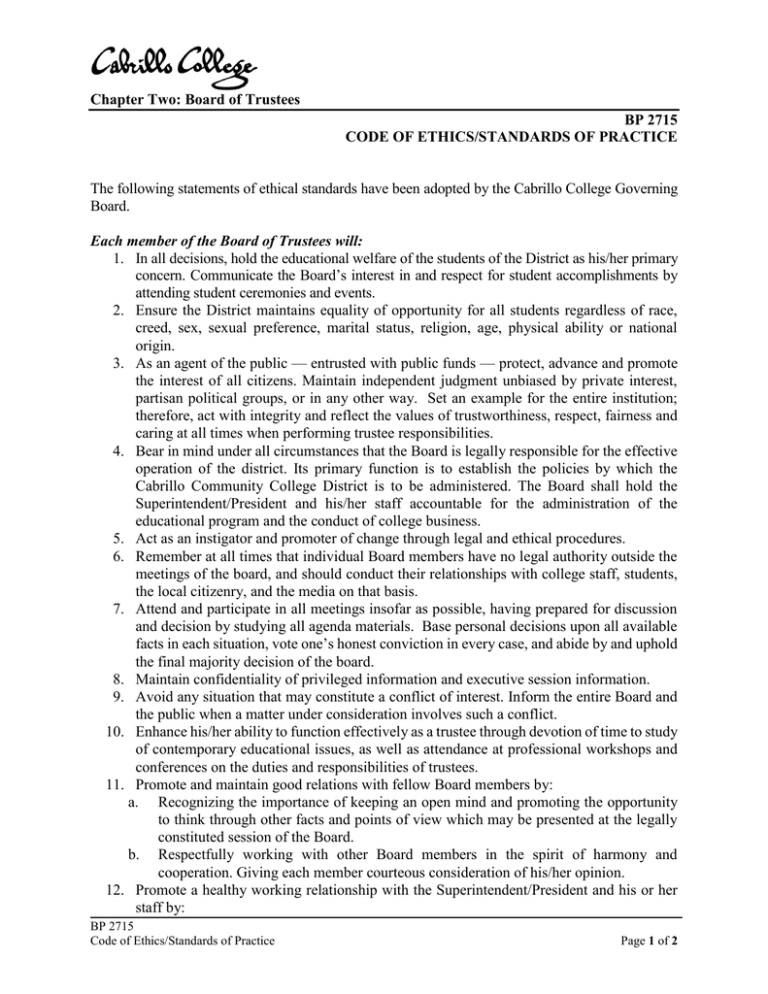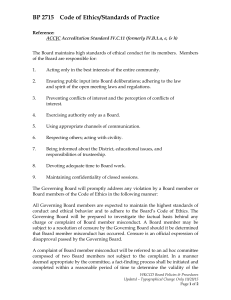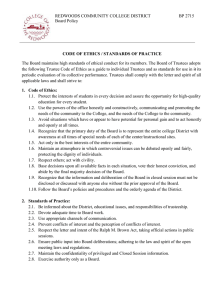
Chapter Two: Board of Trustees
BP 2715
CODE OF ETHICS/STANDARDS OF PRACTICE
The following statements of ethical standards have been adopted by the Cabrillo College Governing
Board.
Each member of the Board of Trustees will:
1. In all decisions, hold the educational welfare of the students of the District as his/her primary
concern. Communicate the Board’s interest in and respect for student accomplishments by
attending student ceremonies and events.
2. Ensure the District maintains equality of opportunity for all students regardless of race,
creed, sex, sexual preference, marital status, religion, age, physical ability or national
origin.
3. As an agent of the public — entrusted with public funds — protect, advance and promote
the interest of all citizens. Maintain independent judgment unbiased by private interest,
partisan political groups, or in any other way. Set an example for the entire institution;
therefore, act with integrity and reflect the values of trustworthiness, respect, fairness and
caring at all times when performing trustee responsibilities.
4. Bear in mind under all circumstances that the Board is legally responsible for the effective
operation of the district. Its primary function is to establish the policies by which the
Cabrillo Community College District is to be administered. The Board shall hold the
Superintendent/President and his/her staff accountable for the administration of the
educational program and the conduct of college business.
5. Act as an instigator and promoter of change through legal and ethical procedures.
6. Remember at all times that individual Board members have no legal authority outside the
meetings of the board, and should conduct their relationships with college staff, students,
the local citizenry, and the media on that basis.
7. Attend and participate in all meetings insofar as possible, having prepared for discussion
and decision by studying all agenda materials. Base personal decisions upon all available
facts in each situation, vote one’s honest conviction in every case, and abide by and uphold
the final majority decision of the board.
8. Maintain confidentiality of privileged information and executive session information.
9. Avoid any situation that may constitute a conflict of interest. Inform the entire Board and
the public when a matter under consideration involves such a conflict.
10. Enhance his/her ability to function effectively as a trustee through devotion of time to study
of contemporary educational issues, as well as attendance at professional workshops and
conferences on the duties and responsibilities of trustees.
11. Promote and maintain good relations with fellow Board members by:
a. Recognizing the importance of keeping an open mind and promoting the opportunity
to think through other facts and points of view which may be presented at the legally
constituted session of the Board.
b. Respectfully working with other Board members in the spirit of harmony and
cooperation. Giving each member courteous consideration of his/her opinion.
12. Promote a healthy working relationship with the Superintendent/President and his or her
staff by:
BP 2715
Code of Ethics/Standards of Practice
Page 1 of 2
Chapter Two: Board of Trustees
a. Appointing and nurturing an excellent Superintendent/President and supporting his or
her administrative recommendations by maintaining a climate of “no surprises.”
b. Supporting the District personnel in the appropriate performance of their duties and
ensuring that they have the requisite responsibility and necessary authority to perform
effectively.
c. Refer complaints, criticisms through the appropriate channels as previously agreed
with the Superintendent/President and the Board.
d. Delegate authority to the president as the board executive officer and confine board
action to policy determination, planning, performance evaluation, and maintaining the
fiscal stability of the district.
13. Be an advocate of the District in the community by encouraging support for and interest in
Cabrillo College.
Enforcement:
All board members are expected to maintain the highest standards of conduct and ethical behavior
and to adhere to the Board Code of Ethics. The board will be prepared to investigate the factual
basis behind any charge or complaint of trustee misconduct. A board member may be subject to
a resolution of censure by the governing board should it be determined that trustee misconduct has
occurred. Censure is an official expression of disapproval passed by the governing board.
A complaint of trustee misconduct will be referred to an ad hoc committee composed of two
trustees not subject to the complaint. In a manner deemed appropriate by the committee, a factfinding process shall be initiated and completed within a sixty day period of time to determine the
validity of the complaint. The committee shall be guided in its inquiry by the standards set forth
in this Code of Ethics. The trustee subject to the charge of misconduct shall not be precluded from
presenting information to the committee. The committee shall, within a sixty day period of time,
make a report of its findings to the governing board for action. If the chair of the board is perceived
to have violated the code, the vice chair of the board is authorized to pursue resolution.
Legal Reference: Accreditation Standard IV.C.11
Adopted: March 7, 1994
Revised: April 9, 2007
Approved: May 7, 2007
Revised: August 6, 2007
Revised and Adopted: November 5, 2007
Revised: May 20, 2015
BP 2715
Code of Ethics/Standards of Practice
Page 2 of 2





